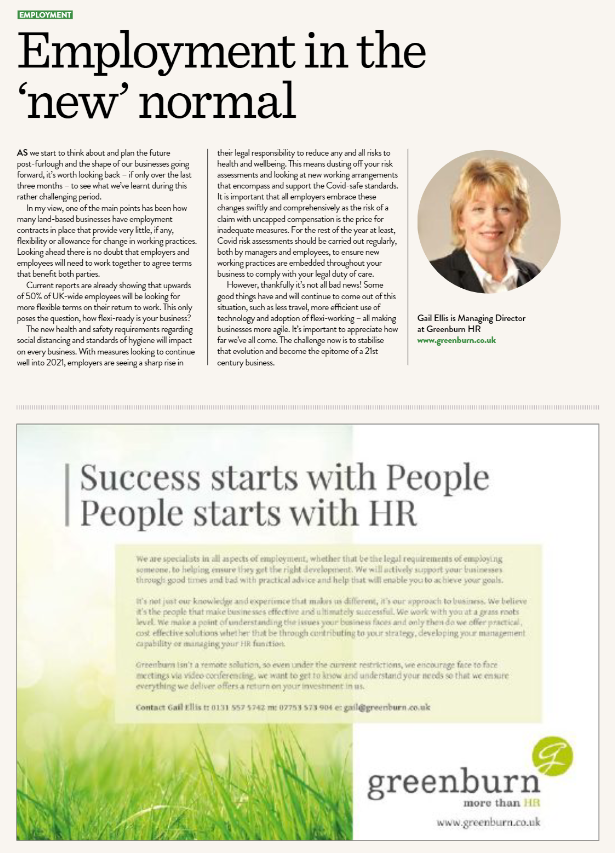|
According to Deimantas Kubilius v Kent Foods Ltd, yes.
An Employment Tribunal decided that the decision by Kent Foods Ltd to dismiss Mr Kubilius after he refused to wear his face mask during the first lockdown was fair. The background of the case was, Mr Kubilius, a lorry driver for Kent Foods Ltd primarily transported goods to and from the Basildon depot and Tate & Lyle's Refinery. During the first lockdown T&L put a temporary Health & Safety measure in place, requiring all employers, contractors and visitors to wear a face mask when on-site to reduce the risk of Coronavirus infection. After visiting T&L in May 2020, Kent Foods Ltd was notified that Mr Kubilius had been banned from the site after repeatedly refusing to put a face mask on when asked, stating that "he was in his cab and didn't have to". Mr Kubilius argued that wearing a face mask was not legally enforceable even in the workplace, and that he had done nothing wrong...
0 Comments
The 19th February 2021 will long have reverence in Employment Law in the UK and abroad. It will be known as the day the UK Supreme Court made the decision to dismiss Uber's final appeal (Uber BV and others v Aslam and others [2021] UKSC 5) in a landmark judgment.
The case against Uber, in regard to employment rights, has been in the courts since 2016. In which Uber claimed that the individuals who worked for them were third-party self-employed contractors and therefore didn't qualify for a number of employment rights under the Employment Rights Act 1996, the National Minimum Wage Act 1998 and the Working Time Regulations 1998. In Scotland, and the UK, there are long-standing tests in law to determine whether an individual is an employee or a contractor. Let's have a look at them here: Whether we like it or not, most Employers will have to restructure their workforce as the UK returns to work.
This could mean anything from heavily recruiting (as we've seen across a number of sectors) to making a number of redundancies. Every decision being made is to ensure that businesses can remain open and trading, and recover as quickly as possible from any damage suffered this year. Businesses need to work through their recovery plan, taking a longer term strategic view. Unfortunately this is one of the toughest discussions and decisions any business has to take, as it isn't about their people, it's about their livelihood. One cannot exist without the other, and it's finding the balance to allow for a effective recovery. Many businesses may find that the post-lockdown economic shock has changed their business needs. It may not be viable to re-start the business after lockdown with the same number of staff doing the same jobs as before. Financial constraints may necessitate a re-shaping of your workforce by re-structuring: reducing hours/days of working, introducing shift patterns, job sharing, redeployment and even making some posts redundant.
It may be necessary to ask certain staff to take on more customer facing roles. These could be low risk employees or those who have had confirmed coronavirus and have some natural immunity toward re-infection; bearing in mind that social distancing measures are still in place and rotational teams provide a far more flexible workforce. To reduce the risk of legal claims, these processes must be handled fairly and within existing legal boundaries - and pro-active communication with your staff to minimise the impact on moral is vital. Despite the political football peppering the UK with ongoing changes daily, we all need to start thinking about how we can adjust our old ways of working to make our working environment safer to staff, visitors and customers.
Social distancing measures are likely to continue well into 2021, so what do you, as an Employer, need to start thinking about now? Employers have a number of common law and statutory duties in relation to health and safety at work, and a starting point will be for all Employers to familiarise themselves with the latest HSE guidance and Government guidance. Detailed guidance has been released for 8 over-branching industries which is a good place to start - you can find those guidelines here: https://www.gov.uk/guidance/working-safely-during-coronavirus-covid-19 As we know "furlough" has become the current buzzword, having never been previously heard of in the UK and with current figures stating that 25% of the UK workforce has been furloughed - a lot of us have invested in the Scheme.
The Scheme - as we know - is a grant, not a loan, and there is no debt associated. However, there are potentially some hidden stingers in the Scheme that Employer needs to be aware of. Part of the deal you agree to when signing up for the Coronavirus Job Retention Scheme is that you, as the Employer, agree with your Employee that they will cease all work when on furlough leave - not just "revenue earning" or "providing non-revenue services". This is where the problems could lie for businesses. Employers are required to retain records for all Employees that have been put on furlough leave for a period of 5 years. This is to give the HMRC a significant period of time to review all applications made for the Scheme to make sure there has been no abuse of the Scheme. With discussions of the relaxation of lockdown becoming more frequent, our thoughts turn to what lingering impact we will see for businesses as they attempt to return to normal.
The lockdown has proved one thing: 1. Which jobs are essential and require an employee to be on-site 2. Which jobs have a larger level of flexibility and could be achieved remotely This isn't something that is going to be easily forgotten by employees and so we need are looking at what employers need to consider when returning to this "new" normal. Something that Employees may not have considered before - another new element of working from home - is tax relief.
Some Employers may already have a working from home "allowance" included in their standard Remuneration packages for Employees. However, most Employers won't have had a huge number of Employees working from home before and so this is all new territory! Employees can apply for a little tax relief while working from home of £6 per week to help cover some of the additional costs of working from home e.g. extended lighting, heating etc. Read on to find out all the information on how to do this! The HMRC portal opened to much anticipation on Monday morning, and within the first half hour over 67,000 claims had been submitted - and so far, the portal has had no technical issues, with the claims expected to arrive in the individual bank accounts within 7 to 10 days.
Our previous blogs cover the subject in depth, so we having clicked through the portal we have put together a short blog covering what you need to have prepared for when you go to submit your claim - as well as a refresh of the eligibility criteria required for both Employers and Employees. And so you don't have to write any of this done, or flick back and forth between tabs (which gets old quickly), you can click the button below and download the PDF of this blog. |
Copyright © 2024

